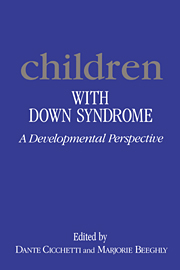Book contents
- Frontmatter
- Contents
- List of contributors
- Preface
- 1 Applying the developmental perspective to individuals with Down syndrome
- 2 An organizational approach to the study of Down syndrome: contributions to an integrative theory of development
- 3 Temperament and Down syndrome
- 4 Interactions between parents and their infants with Down syndrome
- 5 Attention, memory, and perception in infants with Down syndrome: a review and commentary
- 6 Sensorimotor development of infants with Down syndrome
- 7 The growth of self-monitoring among young children with Down syndrome
- 8 Early conceptual development of children with Down syndrome
- 9 Language abilities in children with Down syndrome: evidence for a specific syntactic delay
- 10 Beyond sensorimotor functioning: early communicative and play development of children with Down syndrome
- 11 Peer relations of children with Down syndrome
- 12 Families of children with Down syndrome: ecological contexts and characteristics
- 13 Early intervention from a developmental perspective
- Name index
- Subject index
4 - Interactions between parents and their infants with Down syndrome
Published online by Cambridge University Press: 02 November 2009
- Frontmatter
- Contents
- List of contributors
- Preface
- 1 Applying the developmental perspective to individuals with Down syndrome
- 2 An organizational approach to the study of Down syndrome: contributions to an integrative theory of development
- 3 Temperament and Down syndrome
- 4 Interactions between parents and their infants with Down syndrome
- 5 Attention, memory, and perception in infants with Down syndrome: a review and commentary
- 6 Sensorimotor development of infants with Down syndrome
- 7 The growth of self-monitoring among young children with Down syndrome
- 8 Early conceptual development of children with Down syndrome
- 9 Language abilities in children with Down syndrome: evidence for a specific syntactic delay
- 10 Beyond sensorimotor functioning: early communicative and play development of children with Down syndrome
- 11 Peer relations of children with Down syndrome
- 12 Families of children with Down syndrome: ecological contexts and characteristics
- 13 Early intervention from a developmental perspective
- Name index
- Subject index
Summary
Introduction
This chapter attempts to provide a fairly comprehensive review of research into interactions between infants with Down syndrome and their parents. As suggested by the word “infants,” the focus will be primarily on studies involving children up to about 2 years of age. Nevertheless, because of the generally much slower developmental progress of these children, studies of older children with Down syndrome will also be considered occasionally, especially when their developmental ages were not higher than those of average 2-year-old infants.
Scientific research into interactions between infants with Down syndrome and their parents dates back only about a decade and the data available so far are more fragmentary than one would wish. Although the consistency of some of the findings is encouraging, there are also contradictions and inconsistencies that are not always easy to explain. It is an aim of this chapter to examine at least some of these, and to consider a wider perspective within which they may be understood and even resolved.
In studying that which is in some way exceptional, we are often caught in a dilemma. Should we try to see the unusual in its own right, or should we try to compare it with the norm? There is, in fact, a need and place for both of these, and our understanding of the “exceptional” as well as of the “normal” is advanced through the to-and-fro process of making distinctions as well as finding similarities and analogies.
- Type
- Chapter
- Information
- Children with Down SyndromeA Developmental Perspective, pp. 101 - 146Publisher: Cambridge University PressPrint publication year: 1990
- 13
- Cited by



